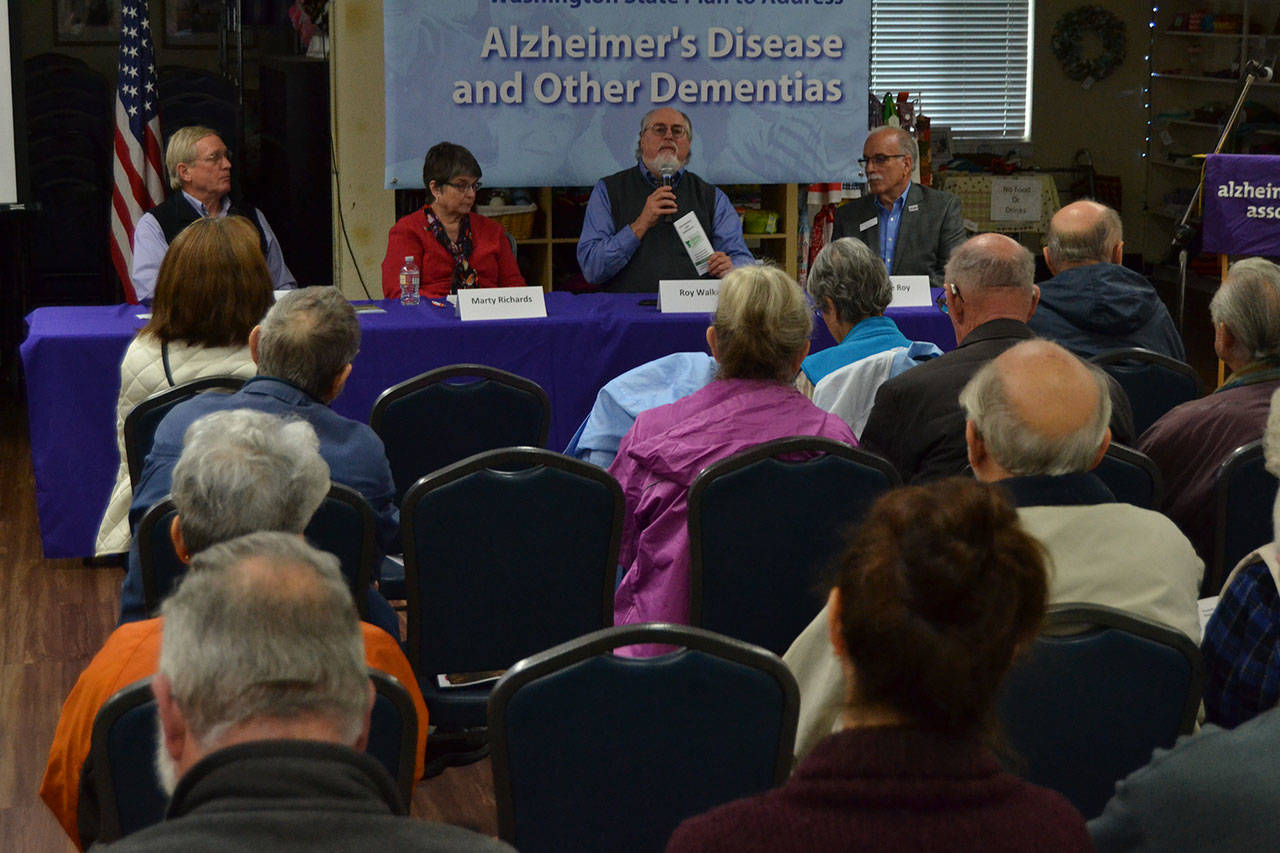SEQUIM — At the current rate, more than 140,000 people in Washington state could be living with Alzheimer’s disease by 2025, researchers estimate.
“What we’re dealing with is nothing less than a public health epidemic,” said Bob Le Roy, executive director for the Alzheimer’s Association Washington State Chapter at a town hall meeting on the topic at Shipley Center on Oct. 8.
Researchers with the association have said the disease is Washington’s third leading cause of death and costs taxpayers nearly $500 million each year in Medicaid payments.
Despite the numbers, local advocates and state officials say there’s hope ahead.
Le Roy and other Alzheimer’s research and care advocates spoke to a crowd of about 30 about the Dementia Action Collaborative’s efforts to implement Washington’s plan to connect people with resources while seeking more research and services support.
Le Roy said the Alzheimer’s Association is asking the state Legislature for $5.4 million in 2019 to promote public awareness and engagement about aging, warning signs of dementia and the value of early diagnosis.
“It’s often harder to make the first connection,” he said. “There are resources people are just not aware of.”
Alzheimer’s Association leaders estimate the more than half of Washingtonians who reported their memory loss is getting worse have not spoken to a health professional about symptoms.
Part of the funding request includes promoting early legal and advance care planning, sharing dementia best-care practices with primary care practitioners and developing a dementia care specialist program.
State Rep. Steve Tharinger, one of the town hall’s panelists, said state leaders have been “moving forward incrementally with support, but we’re starting to see success on a number of these fronts.”
One effort includes the “Dementia Road Map” pamphlet that Tharinger said has been “extremely helpful for people starting out with an early diagnosis.
“What do you do? What do you do legally? It moves you through the process as the disease progresses,” he said.
“That basically came out of caregivers and patients in the (Dementia Action Collaborative).”
Tharinger, a Democrat living in Port Townsend who is running for reelection on the Nov. 6 ballot, represents the 24 Legislative District, which covers Clallam and Jefferson counties and part of Grays Harbor County.
Le Roy said that since 2016 advocates have distributed more than 40,000 copies of the Road Map.
Panelist Marty Richards, who holds a masters degree in social work, said the Dementia Action Collaborative has been one of the most exciting times in her career.
“We want to put an emphasis on what people can do, not just talking about what people can’t do,” Richards said.
Alzheimer’s cafes
One effort has been establishing Alzheimer’s cafes for people with dementia to meet and feel accepted.
One cafe meets at 3 p.m. the fourth Thursday of each month at Ferino’s Pizzeria, 846 Ness’ Corner Road, in Port Hadlock, with the next meeting today.
Sequim Bible Church, 847 N. Sequim Ave., also hosts an Alzheimer’s Association caregivers support group from 1 p.m. to 2:30 p.m. on the second Thursday of each month, with its next meeting on Nov. 8.
Roy Walker, director of Olympic Area Agency on Aging, and a panelist at the Oct. 8 event, said progress in fighting Alzheimer’s disease involves advocacy.
“We continue to tell our electorates that its important to focus on this issue,” Walker said.
“That we want this to be a priority. We want money to go towards the research. We want support for caregivers.”
Tharinger agreed saying activism and voting are important.
He added that Washington spends about $6 billion on long-term adult care and it’s not meeting the need.
“That’s why this dialogue is important,” Tharinger said.
Long-term care
Alzheimer’s Association staff say that in 2016, some 335,000 family members in Washington state provided free care giving for loved ones at an estimated cost of $4.8 billion over 382 million hours.
Several panelists reiterated that Medicare does not pay for long-term care and that many people — about half the population — do not have enough saved for future care.
One solution Alzheimer’s Association staff spoke about is the Long-Term Care Trust Act, a measure up for consideration in 2019 in the state Legislature. It would create a benefit workers ages 18 and older can opt into, with provisions to save for personal care, medical assistance and transportation.
“The Legislature is looking to build a safety net that provides a continuum of care,” Tharinger said.
“It’s a huge challenge to figure out a system that works. We’re going to have to put more dollars into this system.”
Le Roy said advocates for the House and Senate bills are looking into whether or not retirees can buy in more quickly to the saved funds despite a required 10-year vesting period.
To effectively treat and prevent future cases of Alzheimer’s disease by 2025, Le Roy said, the National Plan to Address Alzheimer’s says researchers need $2 billion a year to meet the goal.
Last year, about $1.9 billion was made available for research and support, which Le Roy said tripled from 2015.
The Alzheimer’s Association offers a 24/7 support line at 1-800-272-3900 with clinical social workers on-hand. Find more information online at www.memorylossinfowa.org and www.alzwa.org.
To read the Demential Road Map, see https://tinyurl.com/PDN-dementiaroadmap.
________
Matthew Nash is a reporter with the Olympic Peninsula News Group, which is composed of Sound Publishing newspapers Peninsula Daily News, Sequim Gazette and Forks Forum. Reach him at mnash@sequimgazette.com.

